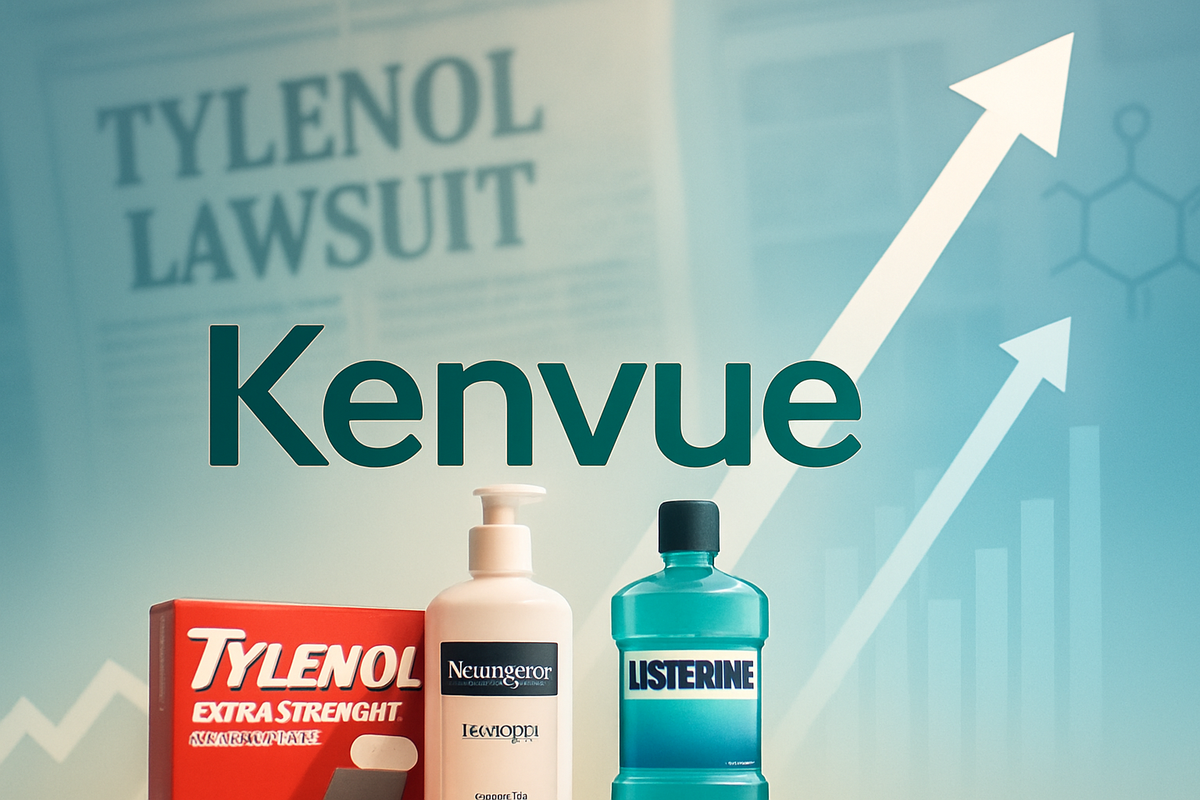
Kenvue (NYSE: KVUE), the consumer health giant spun off from Johnson & Johnson, has experienced a significant rebound in its stock price, climbing notably from a recent record low. This resurgence comes after a period of intense pressure, primarily fueled by controversial, unproven claims linking its flagship Tylenol product to neurodevelopmental disorders. The market's reaction, initially one of sharp decline, has now pivoted, reflecting a reevaluation of the underlying scientific evidence and Kenvue's proactive response. This event not only tests Kenvue's resilience but also offers a critical lens into broader trends in the consumer health sector, from product safety scrutiny to the strategic evolution of post-spin-off entities.
The rebound, observed around September 24, 2025, saw Kenvue's shares rally after hitting a 52-week low of approximately $16.89. On September 23, the stock climbed over 6% to around $18, with pre-market trading on September 24 showing further gains. This recovery was largely driven by reassurances from global health agencies and the U.S. Food and Drug Administration (FDA), which reiterated Tylenol's safety and confirmed no new evidence links its use in pregnancy to autism. Kenvue's strong rebuttal of the claims, coupled with analysts deeming the sell-off "overdone," helped restore investor confidence. The controversy itself stemmed from assertions made by the Trump administration, linking acetaminophen to autism, which caused Kenvue's shares to drop over 9% on September 5, 2025, contributing to a 16% decline in the weeks prior to the rebound.
The Anatomy of a Rebound: Unpacking Kenvue's Volatile Journey
Kenvue's journey since its spin-off from Johnson & Johnson (NYSE: JNJ) has been marked by both strategic ambition and market volatility. Incorporated in February 2022 and named in September 2022, Kenvue completed its Initial Public Offering (IPO) in May 2023, pricing shares at $22 and closing its first trading day at $26.90. The full separation from Johnson & Johnson was finalized in August 2023, with Kenvue becoming an independent entity and joining the S&P 500. Johnson & Johnson divested its remaining stake in 2024.
The recent downturn leading to the record low was primarily attributed to the controversial claims linking acetaminophen to autism. These reports, particularly those amplified by figures like Robert F. Kennedy Jr., created significant uncertainty. Beyond this, Kenvue had already been grappling with slowing organic sales, with Q2 2025 reporting a 4.2% decline, and pressure from activist investors. The company's strategic review of its brand portfolio, potentially leading to divestitures of smaller skincare lines, also contributed to market unease. Gross margins faced pressure, and the company dealt with sluggish household penetration and execution issues in North America.
The catalysts for the recent rebound were multifaceted. Crucially, global health agencies and the FDA provided comfort to investors by confirming the safety of Tylenol and stating that no causal link between prenatal acetaminophen use and autism has been established. While the FDA announced it would add a pregnancy-related autism warning to product labels, it simultaneously alerted physicians that no causal link has been proven. Kenvue's robust defense of its product, emphasizing independent scientific evidence, further bolstered confidence. Analyst sentiment also played a role, with firms like Citi and Barclays suggesting the market's reaction was excessive. Technical indicators also pointed to oversold conditions, hinting at a natural rebound, and retail investor sentiment turned bullish.
Corporate Fortunes: Winners and Losers in Kenvue's Wake
The Tylenol controversy and Kenvue's subsequent rebound have had a profound and specific impact on Kenvue (NYSE: KVUE) itself, with more indirect and nuanced effects on its competitors.
For Kenvue (NYSE: KVUE), the reputational challenge posed by the Tylenol controversy is significant. Tylenol, a brand with a nearly seven-decade history, is a critical revenue driver, generating approximately $1 billion in annual sales and accounting for a high-single-digit percentage of the company's total revenue. Despite the scientific consensus refuting the autism link, the public discourse has placed Kenvue under intense scrutiny. The company has responded vigorously, with CEO Kirk Perry personally engaging with government officials and the company updating its website to reassure consumers, emphasizing the lack of credible evidence. While Tylenol has reportedly maintained market share gains for 12 consecutive quarters, the broader company has faced sales challenges, with Q2 2025 organic sales declining across all three segments (Self Care, Skin Health & Beauty, and Essential Health). Kenvue revised its 2025 outlook downward to a low single-digit organic sales decline. However, the rebound in stock price, driven by scientific reassurances, suggests that the market is beginning to differentiate between unproven claims and established facts. The company is undergoing significant leadership changes and a comprehensive strategic review, aiming to optimize its portfolio and potentially divest smaller skincare brands to unlock shareholder value. Analysts view Kenvue as a "compelling turnaround candidate" for 2025, driven by new leadership and a streamlined focus.
The direct ripple effects on key competitors like Procter & Gamble (NYSE: PG), Colgate-Palmolive (NYSE: CL), and Haleon (NYSE: HLN) are less clear-cut in terms of immediate market share shifts or investor sentiment changes directly attributable to Kenvue's Tylenol situation. However, there are indirect considerations. Procter & Gamble, a consumer goods behemoth, has been identified by analysts as a potential acquirer of Kenvue, given its strong balance sheet and portfolio fit, which could lead to significant earnings accretion. Similarly, Haleon, another consumer health spin-off from GSK (NYSE: GSK), is also seen as a potential strategic acquirer, sharing similar market capitalizations and operational profiles with Kenvue. While a general concern about acetaminophen's public perception could theoretically affect similar offerings across the market, specific data linking Kenvue's controversy to Haleon's or Colgate-Palmolive's performance is not evident. Colgate-Palmolive, despite its own challenges with declining operating revenue and cash flow growth, maintains dominant global market share in its core segments and is expanding in pet nutrition, with management anticipating a return to growth. The primary impact on competitors appears to be through the lens of potential M&A, where Kenvue's valuation fluctuations could make it a more or less attractive target.
Wider Significance: Industry Trends and Regulatory Tides
The Kenvue Tylenol controversy, and its subsequent stock rebound, encapsulates several wider trends and implications for the consumer health and pharmaceutical industries.
Firstly, it highlights the ongoing trend of spin-offs in consumer health. Kenvue, born from Johnson & Johnson's strategic decision to focus on its higher-margin pharmaceutical and medical device businesses, is part of a broader movement seen with companies like GSK (NYSE: GSK) and its spin-off of Haleon. While these spin-offs aim for greater focus and agility, Kenvue's experience demonstrates the vulnerability of newly independent entities to challenges against flagship brands, even if scientifically unfounded. The diverse portfolio of these companies offers some resilience, but a significant blow to a core product can still noticeably impact earnings and investor confidence.
Secondly, the event underscores the critical and ever-present issue of product safety and regulatory scrutiny. The consumer health sector is inherently sensitive to safety concerns, which can lead to recalls, financial repercussions, reputational damage, and litigation. The Tylenol controversy vividly illustrates the challenge companies face in navigating the disparity between scientific consensus and public claims, especially when amplified by influential figures. Despite the overwhelming medical evidence supporting acetaminophen's safety during pregnancy, the mere existence of the debate forced Kenvue into an aggressive communication strategy to maintain consumer trust. This scenario could lead to increased scrutiny on other widely used "safe" OTC products and potentially prompt other pharmaceutical companies considering spin-offs to enhance their product safety protocols and communication strategies.
From a regulatory perspective, the FDA's decision to update Tylenol labels to reflect a possible association, while reiterating no causal link, signals a move towards increased caution and transparency, even in the absence of definitive causality. This could set a precedent for other OTC drugs, leading to more nuanced and market-specific regulations. Consumer advocacy groups and policymakers might push for stricter safety standards and more robust pre-market and post-market surveillance for OTC drugs.
Historically, the Kenvue Tylenol situation draws comparisons to other major product safety crises. The 1982 Tylenol Murders, where cyanide-laced capsules led to fatalities, serves as a benchmark for crisis management, with Johnson & Johnson's swift and transparent response rebuilding trust. This precedent likely informed Kenvue's proactive defense. Other historical events like the Thalidomide crisis (1950s-1960s), which led to profound changes in drug testing and regulatory approval processes, and Merck's Vioxx recall (2004), which highlighted the financial and reputational costs of undisclosed side effects, underscore the lasting impact of product safety controversies on industry practices and public perception. While the current Tylenol debate is different in nature, it reinforces the enduring importance of scientific evidence, transparent communication, and proactive engagement with regulatory bodies to maintain consumer confidence in the consumer health sector.
The Road Ahead: Kenvue's Future Trajectory
Looking ahead, Kenvue's (NYSE: KVUE) future outlook presents a mix of strategic pivots, market opportunities, and potential challenges.
In the short term (2025), Kenvue is primarily focused on stabilization and strategic implementation. The company has revised its 2025 outlook, anticipating low-single-digit declines in organic sales, largely due to foreign currency headwinds and subdued demand in certain categories. Its "Extraordinary Powers" strategy, including the "Our Vue Forward" initiative, aims for $350 million in annual cost savings by 2026, earmarked for reinvestment in core brands and marketing. Recent leadership changes, including an interim CEO and a new CFO, signal a proactive approach to operational improvements. Kenvue also plans a 40% increase in innovation launches in 2025, focusing on premiumization and category extensions.
The long-term outlook for Kenvue aims for sustained organic sales growth from 2025 onwards, normalizing around 4.5%. The company benefits from a solid financial foundation with strong gross margins and moderate debt. Kenvue's strategy hinges on leveraging its iconic brands, global reach, and innovation pipeline within a global consumer health market projected to exceed $1 trillion by 2027. The company is strategically positioned to capitalize on e-commerce and direct-to-consumer (DTC) channels, which already account for a significant portion of its sales.
Strategic pivots and adaptations for Kenvue include aggressive portfolio optimization, particularly within its underperforming Skin Health & Beauty segment. The company is considering divesting smaller, non-core brands to streamline its focus on high-margin, core brands like Neutrogena, Aveeno, Tylenol, Listerine, and Zyrtec. M&A activities are also a significant factor; Kenvue has been the subject of takeover speculation, especially with the approaching expiration of its post-spin-off tax agreement with Johnson & Johnson in August 2025, which could make it a prime target for larger consumer goods conglomerates like Procter & Gamble (NYSE: PG) or Unilever (NYSE: UL). Kenvue itself has also made smaller acquisitions to enhance its portfolio. Furthermore, enhanced R&D remains a priority, with substantial investments aimed at launching 10-15 new products annually, focusing on innovation within existing lines and digital health solutions.
Market opportunities for Kenvue include capitalizing on shifting consumer behavior towards self-care, preventative health, and personalized solutions. The rise of digital health integration, Rx-to-OTC switches, and emerging product categories like OTC responses to GLP-1 weight loss drugs, along with sustainable practices, offer avenues for growth. However, challenges persist, including intense competition from major players and niche brands, ongoing regulatory scrutiny and litigation risks related to product liability, and the need to turn around underperforming segments. Macroeconomic headwinds like foreign currency fluctuations and the need for continuous, transformative innovation are also crucial.
Potential scenarios and outcomes for Kenvue range from an optimistic "Successful Turnaround and Strategic Reinvention," where the company effectively divests non-core assets, revitalizes segments, and leverages R&D to become a leader in innovative, digitally-integrated consumer health. A "Steady Performance with Moderate Growth" represents a base case, where gradual improvements are made, but growth remains moderate, and the company navigates challenges without major disruptions. A pessimistic "Prolonged Challenges and Market Share Erosion" scenario could see the Tylenol controversy escalate, leading to significant consumer mistrust, legal battles, and a decline in sales, potentially making Kenvue a vulnerable M&A target at a reduced valuation.
Wrap-Up: Navigating the Evolving Consumer Health Landscape
Kenvue's recent stock rebound from a record low, following intense scrutiny over its Tylenol brand, serves as a compelling case study in market resilience and the complexities of the modern consumer health industry. The key takeaway is the market's capacity to differentiate between scientifically unfounded claims and established medical consensus, allowing for a swift recovery in investor confidence once clarity emerges. However, the event has undeniably highlighted the enduring vulnerability of even iconic brands to public perception and the critical importance of transparent, evidence-based communication in crisis management.
Moving forward, Kenvue's trajectory will be closely watched. Its ability to execute its "Extraordinary Powers" strategy, including portfolio optimization and cost savings, will be paramount in driving organic growth and improving profitability. The performance of its Skin Health & Beauty segment, a historical drag, will be a significant indicator of its turnaround success. Investors should also pay close attention to potential M&A activities, particularly after the expiration of its tax agreement with Johnson & Johnson in August 2025, as Kenvue could become a prime target for larger consumer goods conglomerates. Furthermore, Kenvue's continued investment in R&D and its ability to innovate in emerging digital health and self-care categories will be crucial for long-term competitiveness in a dynamic market.
The broader consumer health market itself is poised for significant growth, driven by an aging population, increasing self-care trends, and technological advancements. Companies that can effectively leverage data, AI, and e-commerce, while nimbly adapting to evolving consumer preferences and regulatory environments, are best positioned for success. Kenvue's experience underscores that even in this growth-rich environment, challenges such as intense competition, regulatory scrutiny, and the need for continuous, transformative innovation remain ever-present. Investors should monitor Kenvue's strategic execution, its ability to maintain brand trust, and the broader shifts in consumer health and regulatory landscapes in the coming months.
This content is intended for informational purposes only and is not financial advice






